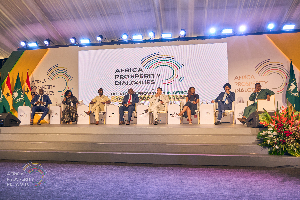Government is currently conducting a diagnostic study on existing indigenous companies that are in distress to ascertain what stimulus packages it can offer them to revive their operations to make them competitive.
This was revealed by the Minister-designate for Trade and Industry, Mr Alan Kwadwo Kyerematen, yesterday when he took his turn before the Parliamentary Appointment Committee for vetting.
Mr Kyerematen further outlined a number of initiatives his ministry will bring to bear in trade facilitation and business development agenda of the new administration.
According to the nominee, the foundations for the trade facilitation and business development had been laid by the previous NPP administration and many of which was kept alive by the immediate past administration.
He was, however, optimistic that given the focus of the new administration significant achievements would be noticeable in the areas of trade and business facilitation efforts in the next four years.
Special Bank support for business
Mr Kyerematen specifically mentioned Exim Bank, an export finance institution and the Industrial Development Bank as a two major institutions that would be instrumental in aiding the country’s industrial transformation agenda.
He explained that these two institutions living up to their mandate would help resource local businesses and industries to be competitive and effectively help balance the country’s trade deficit.
With the needed support, Mr Kyerematen was optimistic that a lot of the country’s numerous produce could be processed to add value and increase the fortunes of the farmers across the country.
National Investment Bank to be resourced
The Ministerial nominee stated that the National Investment Bank (NIB) would be resourced to provide credit to companies while the government will limit its borrowing from the financial institutions.
Moreover, he said, the government would reduce the Treasury Bill Rate, which would, in turn, reduce the willingness of financial institutions to lend to the government, but rather provide credit to the local businesses or entrepreneurs.
Mr. Kyerematen, who is an international consultant on Trade, said the government would also establish anchor industries such as iron, aluminium and pharmaceutical industries, and also promote the manufacturing of machine components, which would have fundamental effects on the economy.
The nominee gave the assurance that the government would promote domestic trade by improving the retail market and ensure effective compliance with the Local Content Legislation.
“We would also embark on aggressive programmes through export diversification on the regional market, especially on the African continent and the sub-region,” he stated.
One district, one factory
He said the One-District, One-Factory initiative was designed to create massive employment, and, therefore, the government’s Technical Study Group would meet the Members of Parliament to seek their support towards implementing the initiative.
He said though the previous NPP Government, in 2007, undertook the study of the 110 districts at that time and developed a business plan, which was geared towards rolling out the initiative.
Mr Kyerematen said the government would also add value to potential export commodities and identify potential export substitution products, which would be produced locally to enhance the country’s revenue base.
Pwalugu tomato factory & dev of the north
As part of government’s effort to improve living conditions and drive the development agenda of the three Northern regions, Mr Kyeremanteng noted the immediate plans by his ministry to revive the Pwalugu tomato factory as it was tightly linked to industrial transformation agenda for those regions.
When revived, the minister-designate was confident that it would go a long way to improve the economic conditions of the people in the regions.
Additionally, he mentioned plans by his ministry to partner the Agric Ministry for livestock production to feed a meat industry that would be expanded by government in the near future.
He also mentioned the establishment of a viablemechanism for the collection and processing of sheanut and a commodity exchange for the grains market. Support for automobile industry. The new administration intends to employ a “strategic anchor initiative” to develop the automobile industry in the country.
According to the Minister-designate for Trade and Industry, government has started identifying the existing factories that have the capacity and attracting the needed direct foreign investments to make them globally competitive.
Promoting made in Ghana goods & services
To help promote and make globally completive, locally-produced products and services, Mr Alan Kyerematen said his ministry would pursue an aggressive campaign to promote made in Ghana goods.
He mentioned for example the establishment of an e-commerce platforms to showcase locally produced goods together with the needed push for domestic retail infrastructure.
Additionally, he mentioned policy plans by government to use institutional procurements as a means to execute the agenda to increase patronage of made in Ghana products.
In furtherance of the agenda for industrialisation, Mr Kyerematen mentioned key policy initiatives such as reduction in levies and charges on businesses, reducing interest rates, create a cost effective energy supply for industrial use and many others as part of government efforts to achieve its economic goals.
Business News of Tuesday, 24 January 2017
Source: thefinderonline.com
Stimulus package unveiled
Entertainment
















